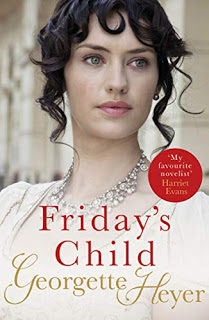
God: God is often conceived as the Supreme Being and principal object of faith. The concept of God as described by theologians commonly includes the attributes of omniscience. . .

God: God is often conceived as the Supreme Being and principal object of faith. The concept of God as described by theologians commonly includes the attributes of omniscience. . .
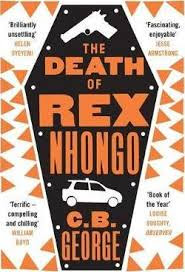
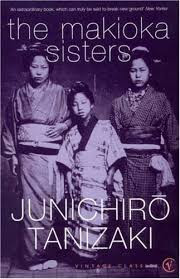
Regarded by many as the finest novel of twentieth century Japanese literature, THE MAKIOKA SISTERS is the story of four sisters in the years leading up to World War II.
It’s really a rather sad book, though based on the plot alone I wouldn’t be able to say why. The plot is: they want to get the two younger sisters married. And I guess it ends happily, with both sisters on their way to the altar. This is the traditional happy ending. But here you go with the bizarrely anti-climatic last line of the book:
Yukiko’s diarrhea persisted through the twenty-sixth, and was a problem on the train to Tokyo.
That gives you the flavour. This book is much less about plot, than it is about all the many ordinary days that make up all our lives between plot points. You meet the love of your life; then you still go to the dentist that afternoon. You still go to work. One day he will propose and on that day you might be wearing tight pants or a kimono that creaks.
Based on my summary above, giving the dates it covers, you’d think it might be a book about politics, but it is almost defiantly not. It’s purely, almost aggressively, about domestic life, and life before the war. Tanizaki was writing it during the war, so my theory is that this is why; he wanted to recreate a world that was already decaying, and that is what gives it is sadness.
The sisters themselves (I am sure not coincidentally) capture this movement from past to future, with the one unmarried sister a classic Osaka lady (which I now know means reserved and delicate), and the other more modern, wearing Western clothes and even having her own business making dolls. The family is going down in the world, and the reason they are struggling to marry is they are overestimate who they can get. At the beginning they decline a perfectly nice man because his mother might be mentally ill; at the end they are glad to accept a guy with no money and a sketchy past.
It’s done with a light hand, but it’s very successful; at the end I was left feeling almost homesick for pre-war Japan. That’s if you exclude all the Beri-Beri. I wasn’t so keen on that. (I had no idea it was such a big issue in Japan. Click here for very interesting history, one of the few where the rich get what they deserve)
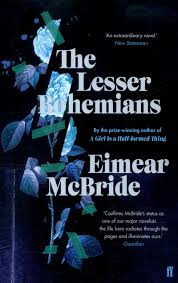
I move. Cars move. Stock, it bends light. City opening itself behind. Here’s to be for its life is the bite and would be start of mine.
Remember. Look up. Like the face of god was lighting me through these grills above, through windows once a churn this hall, and old men watching below.
LaterBreath of winter on me, brain crawling little from drink, I sit where he was with The Devils that nigh and read my book like pub doors are quiet and will not look up for him. Then at my shoulder Women in Love? – stoops to my cheek but gets an earlobe – Thought you’d be long past the Lawrence phase. Well, hello to you too, I lifting my eyes to him, damp and cold-faced from the wind. Have a few in you already? I do. Better catch up, and to the barmaid – rubbing heat in his hands – Two, when you’re ready, and a salt and vinegar please. Come on, that table’s free.
Silent in his room. Cigarette. Sit of shift? I halfly dress. Stay or leave? What do men expect? What would I like? To know exactly what he considers to be the right what now.
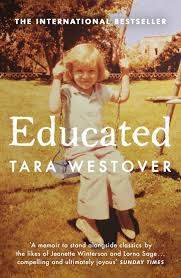
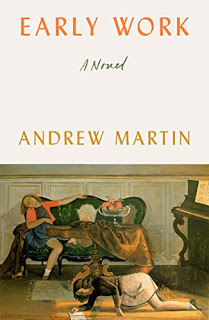
Let’s begin with this book’s beginning:
Like most people trying to get by in something like the regular current of American life, I don’t act like a total asshole to most people I meet, and am generally regarded as pretty nice, mainly because I leave myself vulnerable to hearing out other people’s crises and complaints for longer, on average, than would be merely polite. And the fact is, I do tend to like people in practice, even though I’ve built an airtight case against them in principle. It’s a natural response, I guess, to being raised by relatively kind parents who taught me to be polite and decent and to rely on the company and help of others, but to also consider myself smarter and, on some fundamental level, more deserving of complete fulfillment than anyone in the world besides maybe my sisters.
I mean, how can you not love it already? What a fabulous pair of sentences, packed with interesting ideas, and written in a contemporary voice that remarkably doesn’t seem pretentious. This sets the tone for what is a wonderful book about cheating on your girlfriend. I particularly enjoyed its fun dialogue:
“What do you do, Gil?” I said.
“I work for ThinkBright?” he said “We do design and tech consulting?”
“The Lord’s work,” I said.
I urgently need an opportunity to say this in normal conversation. People are always telling they are bankers and such like. I also liked this:
“Okay, but do you like living in Virginia?” she said pointedly. “Is living in Virginia lowering or heightening your sense of existential dread?”
“My basic status is medium-happy,” I said. “We’ll have to move when Julia gets the next thing, so it’s not useful to analyze it too much. Do I need to have a position? I’m not running for office. I’m not trying to be the president of selfhood.”
And this:
“We’re adults,” I said, the universal marker of childish behaviour. “This doesn’t have to be a big deal.”
It wasn’t just the zippy dialogue I enjoyed (though that’s enough). It was also a thoughtful story about about choosing between two good options, as even while cheating on his girlfriend he continues to really like her:
I still loved Julia. That wasn’t really in question. I had plenty of love. It was, I was realizing, a callous kind of love. That seemed to be all I had to give. Anyone I was with would realize that eventually, I thought, with my feet in the water, so really the goal was to create the illusions of depth for as long as possible. Not for the sex, no. For the company. Other people were interesting, and the more privileged time you had with them the less bored you would be. They would teach you how to live, or at least entertain you while you failed to learn. And it wasn’t entirely selfish, because, to other people, you were someone else, too, someone interesting, even if you knew you weren’t.
And it wasn’t just about romance, either. Both of the women he is involved with are writers, as is he; and one of the more interesting parts of the novel are his efforts to write, at which he is failing. He procrastinates, he deletes, he makes excuses, while both the women who are waiting on him continue to work: they write, and he doesn’t. I found it a striking part of the story; you’d think he has all the power, because frankly he is the one doing the choosing, but somehow he doesn’t; he’s winning in terms of other people, but somehow losing in terms of himself.
If we used our bread to mop up pasta sauce, he yelled, “Don’t lick your plates! Don’t dribble! Don’t slobber!”For my father dibble and slobber also described modern painting, which he couldn’t stand.
He would say, “You have no idea how to behave at the table! I can’t take you lot anywhere.”

She knew in her heart that she was no really enjoying this sort of thing, but the habit of useless activity was too strong to be snapped by a change of scene.
She, Laura Willowes, In England, in the year 1922, had entered into a compact with the Devil.
They say: “Dear Lolly! What shall we give her for her birthday this year? Perhaps a hot water bottle. Or what about a nice black scarf? . .. But you say: “Come here, my little bird! I will give you the dangerous black night to stretch your wings in, and poisonous berries to feed on, and a nest made of bones and thorns, perched high up in danger where no one can climb to it.” . . .
. . . One doesn’t become a witch to run around being harmful, or to run around being helpful either, a district visitor on a broomstick. It’s to escape all that – to have a life of one’s own, not an existence doled out to you by others, charitable refuse of their thoughts, so many ounces of stale bread of life a day . ..
Respectable countrywomen keep their grave-clothes in a corner of the chest of drawers, hidden away, and when they want a little comfort they go and look at them, and think that once more, at any rate, they will be worth dressing with care
During the last few years of her life Mrs Willowes grew continually more skilled in evading responsibilities, and her death seemed but the final perfected expression of this skill. It was as if she had said, yawning a delicate cat’s yawn, ‘I think I will go to my grave now,’ and had left the room, her white shawl trailing behind her.
The maid who brought her morning tea. . . had an experienced look; when she drew back the curtains she looked out upon the day with no curiosity. She had seen it all already
Laura . . . had commented upon the beautiful orderliness with which Caroline’s body linen was arranged therein. ‘We have our example,’ said Caroline. ‘The grave-clothes were folded in the tomb. . ..
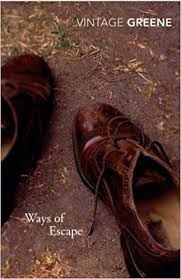
A few months ago I read the first part of Greene’s autobiography, A SORT OF LIFE, that covered his upbringing, first job and first novel. The picture that emerged was of a rather sad young man. WAYS OF ESCAPE is the second installment, and here we find a rather sad middle-aged man.
It’s yet another depressing example of the fact that success apparently doesn’t make you happy. BUT WHY NOT? It seems so unfair. Also a life of glamour and incident doesn’t work, as both of those Green had in spades. He was a successful novelist, and a journalist, and a spy, spending his life in many interesting locations (Vietnam, Sierra Leone, Liberia) among many interesting people. And yet he seems to frame it all as various escapes; he writes books to get away, he goes to dangerous places to get away, but all the while you can’t tell what it is he is trying to get away from.
Mostly I think he is trying to escape that most dogged pursuer, his self. Also, based on his novels, I’d be willing to bet his marriage is pretty unhappy. We don’t find out this juicy stuff though, because as he tells us “I felt that the .. years belonged as much to others as to myself. I couldn’t infringe their copyright. . . They had a right to privacy, and it was impossible to deal with my private life without involving theirs.” How charmingly old-fashioned and thoughtful that seems, especially after just reading THE END. So instead the autobiography is an account of how his novels came to be, which is interesting in itself.
And in learning about the work, you learn something about the man. As a former theatre person myself, I was especially touched to see how he came to love the stage – not as an art form, but as an experience. Let’s end with this rather lovely reflection:
I had imagined that to write a play and to write a film would be very similar: the author, though he could not be excluded from rehearsal, would be an unwelcome stranger lurking ashamed in the studio. . . I had not anticipated the warmth, the amusement, the comradeship of the theatre. Above all I had not realized that the act of creation, as with the novel, would continue for long after the first draft of the play was completed, that it would extend through rehearsals and the opening weeks of the tour. It is for that act of creation that one lives, and after the author has returned from tour, how empty the hours are, the telephone rings seldom – couldn’t we have delayed launching a little longer for the sake of the fun?
Poor guy
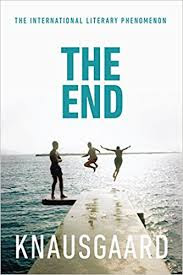
This is the sixth and last book of MY STRUGGLE, Karl Ove Knausgaard’s monumental autobiography. It’s been four thousand pages, and it feels funny to leave him at last.
The series started with his father’s death, and then moved around in time, covering his childhood, adolescence, first marriage, second marriage; and now this one takes us through the early years of his childrens’ lives, the blowback from the publication of the first novels in the series, and the early life of Adolf Hitler.
Yes, for some reason there is a four hundred page sidebar on Hitler. Why? I can’t say I know. Let’s get the sidebar out of the way first. Generally, I think it is creepy to be overly interested in Hitler. It’s also not very illuminating; Karl Ove is a novelist, not a historian or academic (indeed, he did not work very hard at school, as I know, because I spent six hundred pages on the topic), and it shows. So while you don’t learn so much about Hitler, you do learn a lot about Karl Ove, and Scandinavia. It’s funny to see how unimaginable Weimar Germany is to a contemporary Norwegian, and it’s hilarious to see how much emphasis he puts on the character of Hitleer as a driver of the war as opposed to say economic meltdown and hyperinflation, which is obviously by far the bigger issue (I guess a Zimbabwean is always going to think everything is about hyperinflation). That said, I did find some interest in extracts from MEIN KAMPF. I mean, you know that book is always going to be crazy, but try this, even the first few sentences are far more batshit than you would ever imagine:
TODAY it seems to me providential that Fate should have chosen Braunau on the Inn as my birthplace. For this little town lies on the boundary between two German states which we of the younger generation at least have made it our life work to reunite by every means at our disposal.German-Austria must return to the great German mother country, and not because of any economic considerations. No, and again no: even if such a union were unimportant from an economic point of view; yes, even if it were harmful, it must nevertheless take place. One blood demands one Reich.
Okay, Hitler. This Hitler digression is bizarre, but not actually so bizarre as the rest of the book. A discussion of Hitler’s life at least fits into a framework with which we are familiar. What Karl Ove tries to do is something quite out of our experience: actually write about his own life, as honestly as he can. It’s a truly weird thing to do, and in early books I hadn’t quite appreciated how much he was really telling his life. In this book, he describes how people around him responded to the earlier books coming out. His brother, for example, who read in the book how he felt about him for the first time; his high school girlfriend; his wife. In this book he tells us how, after he emails out drafts to them, he lies on his bed and shivers in fear for hours. (Let’s not forget that Karl Ove is not a tough guy: he was terrified as a child of indoor plumbing as I recall.).
Apparently the whole idea came to him on a dreadful package holiday in the Canary Islands, right after he almost got conned into a timeshare. He was inspired by the diaries of someone called Gombrowicz.
. . to go down beneath the surface, beneath the ideologies, which you can only stand up to by insisting on your own experience of reality, and not by denying it, for that is what we do, all the time, deny the reality we have experienced in favour of the reality we have learned, and nowhere was the betrayal of the I, the unique and individual I, greater than in art, as art has always been the privileged domain of the unique. My hands trembled at the very thought, that I could actually describe everything as it was. That all I had to do was just go ahead and do it. What a treacherous thought!‘Just’ my arse!
. . . because I have always had such a weak ego, always felt myself inferior to all others, in every situation. Not only the brilliant individuals I have met, who with their charisma, intelligence and talent have outshone all others, but also taxi drivers, waiters, train conductors, in fact every kind of person one can possibly meet out there. I am inferior to the man who washes down the stairs and the corridors in the building in which we live, he possesses an authority greater than mine in that situation, so for instance, if he says something about the stroller and the balance bikes left outside our door, in a voice that carries even the slightest hint of annoyance, I tremble.
. ..if you want to describe reality as it is, for the individual, and there is no other reality, you have to really go there, you can’t be considerate. And it hurts. It hurts not to be considered and it hurts not to be considerate. This novel has hurt everyone around me, it has hurt me, and in a few years, when they are old enough to read it, it will hurt my children. If I had made it more painful, it would have been truer.
It has been an experiment, and it has failed because I have never even been close to saying what I really mean and describing what I have actually seen, but it is not valueless, at least not completely, for when describing the reality of an individual person, when attempting to be as honest as possible is considered immoral and scandalous, the force of the social dimension is visible and also the way it regulates and controls individuals.
The truth was that when I sat down to write the novel I had nothing to lose. That was why I wrote it. I wasn’t only frustrated, the way you can become when you live as a parent with small children and have many duties and have to sacrifice yourself, I was unhappy, as unhappy as I have ever been, and I was all alone.My life was quite dreadful, that was how I experienced it, I was living a dreadful life, and I wasn’t strong enough, I didn’t have the spine to abandon this and start anew. I often thought about leaving, sometimes several times a day, but I couldn’t do it . . . But that was what made me decide to write a novel in which I threw caution totally to the winds and told it as it was. Only when the book was ready to be published did I realise what I had done and went through the manuscript and crossed out the worst.